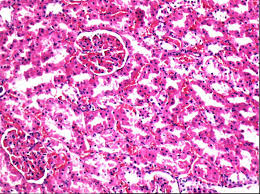Background. The kidneys are doselimiting
organs when total body irradiation or
irradiation of the digestive tract is planned. The
incidence of radiation-induced toxicity is probably
underestimated due to its latency and confounding
factors like chemotherapy. Material and methods.
A search of the literature for radiation induced
renal toxicity was performed. Results. Most toxicities
occur around 18 months. Renal mobility is
significant in terms of dosimetric consequences,
in particular in the young child. In case of total
body irradiation, the dose responsible for a 5%
risk of toxicities is around 16 Gy in 2Gy fractions
over 2 weeks. For partial renal irradiation, the
volume receiving 20 Gy should be below 32% of
the total renal volume. Compensatory mechanisms
remain possible in areas receiving 12 Gy or less in
1 Gy fractions. When nephrotoxic chemotherapy,
these tolerance doses must be lowered. Treatment
of radiation-induced nephropathy may include
ACE inhibitors. Discussion/conclusion. Prospective
assessment of dose-volume histograms and
consideration of renal mobility in treatment plans
along with improving radiation techniques should
help to improve treatment plans including the kidneys.


